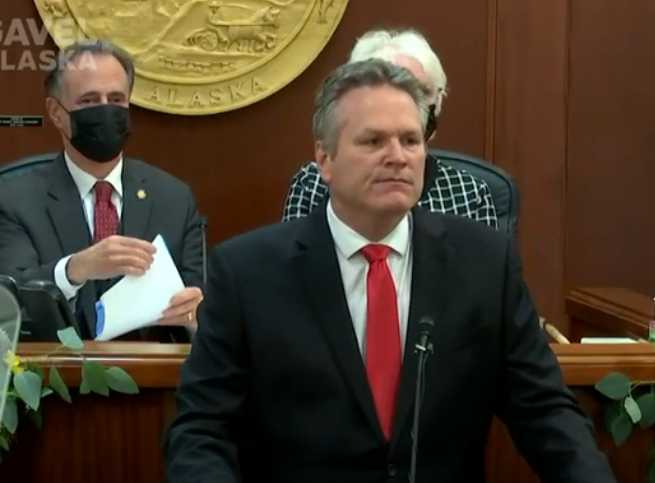(Anchorage) – Friday, Alaska Governor Mike Dunleavy introduced three bills, a portion of the People First Initiative, intended to address several public safety issues in Alaska. The three pieces of legislation focus on statutory changes in sex trafficking, victim protection, and sex offenses by putting people first and making Alaska safer.
“Safety and prevention are my administration’s top priorities, and these new bills reflect our determination to make Alaska a safe place for everyone,” said Governor Dunleavy. “Alaska’s current laws do not provide appropriate protections for victims – that is unacceptable. We are introducing the three bills to protect Alaska’s most vulnerable. Through the People First Initiative, we are going to solve these long overdue issues.”
The Sex Trafficking bill provides a new offense series and sentencing that classifies sex trafficking as a crime against a person and amends the conduct criminalized to address how trafficking occurs. The legislation also targets those who patronize those engaging in sex work; a patron of a sex trafficking victim is a class B sex felony if the victim is under 18 years of age, and a class C sex felony if the person is over 18 years of age. This offense is also a registerable sex offense. The bill clarifies that human trafficking is about labor and is different from sex trafficking. Finally, the legislation allows a person convicted of prostitution to request the conviction to be vacated if they were a victim of sex trafficking at the time of the prostitution offense.
“These long-overdue updates to Alaska’s criminal statutes will help survivors of sex trafficking expunge the criminal records that have punished the victim and held them back from getting good jobs, a home, or from simply moving on,” stated Staci Yates, Director of Human Trafficking Recovery Services at My House.
The Victim Protection bill makes several statutory changes to protect Alaska’s crime victims. The bill requires the defendant to give the prosecutor 48 hours’ notice of a request to modify bail. The bill also requires the judge to issue written findings explaining how the bail and conditions of release will ensure the appearance of the defendant and protection of the victim and community. The legislation creates a rebuttable presumption that a person who has previously violated their conditions of release will not appear and will pose a danger to the victim and community. It requires some additional jail time imposed for each conviction for the crime of violation of conditions of release.
The bill allows key witnesses, typically the officer in the case, to summarize the testimony of the other witnesses. The legislation requires those who are under the jurisdiction of the Department of Corrections (DOC) or who must register as a sex offender with the Alaska Department of Public Safety (DPS) to notify those departments when they file a petition to change their name. In addition, persons who have cases pending are required to advise the court of the pending case. Lastly, it returns the Plain Error Rule (Criminal Rule 47) to what it had been from statehood until 2011. Originally, a defendant could only raise an error on appeal if the error was objected to when the alleged error occurred. The exception to this rule was when the error was deemed “plain.” In 2011, the definition of “plain” broadened, which jeopardizes the integrity and fairness of the system. Returning the rule to its prior interpretation will adequately protect the defendant’s rights on appeal while also appropriately preserving the integrity of the conviction and the finality of the case for victims.
“On behalf of Victims for Justice, we are very encouraged to see increased victim investigation and notification in hub communities throughout the state,” said Blaze Bell, Victim Rights Advocate. “On a personal note, as someone who has experienced navigating the criminal justice system as a crime victim, I am deeply grateful to see the increase in victim focused trauma informed actions in both Grand Jury options and Victim notifications. These changes bring me great hope for our community and my fellow survivors.”[content id=”79272”]
The Sex Offenses bill creates a class C felony offense for sexual contact (directly or through clothing) where there is no force or the threat of force. This offense would be a registerable sex offense upon the second conviction. The legislation closes the gap in Alaska’s current criminal laws on sex offenses – whereas now the current law requires force or the threat of force for unwanted sexual contact to be sexual assault.
The bill updates Alaska’s sex offender registration by categorizing additional offenses, such as sending an explicit image of a minor and misconduct involving a corpse, registerable. Furthermore, it aligns Alaska’s sex offender registration more closely with the federal registration by requiring sex offenders to provide DPS with additional information. Additionally, the legislation requires a lifetime revocation of an Alaska teaching certificate if convicted of distribution or possession of child pornography.
The three bills, part of the People First Initiative, combine concepts from stakeholder groups and survivors to give law enforcement and prosecutors the tools they need to protect victims. For the past four years, the Dunleavy Administration has continued to reverse the previous cuts to DPS and the number of Alaska State Troopers. The administration has introduced four years of increased resources for DPS and DOC.
“These much-needed updates to Alaska’s criminal statutes will help provide Troopers, local law enforcement officers, prosecutors, and judges with the tools that they need to make our communities a safer place to live, work, and raise a family,” stated Alaska DPS Commissioner James Cockrell. “Your Alaska State Troopers are dedicated to doing our part to reduce instances of sexual assault, child sexual abuse, and sex trafficking occurring in our state, and hold those that victimize Alaskans accountable for their horrific actions.”
###[content id=”79272″]








